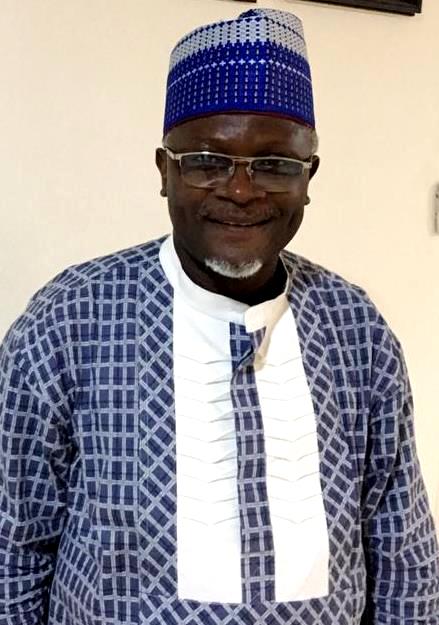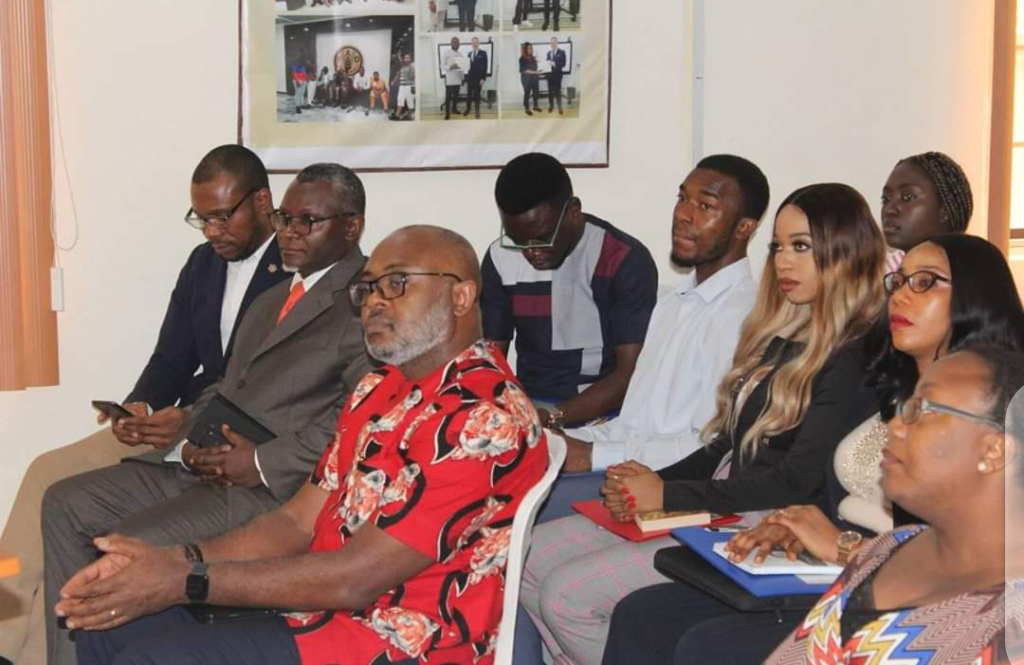Fuh J Che is a faculty Member of Rome Business School Nigeria in Marketing and Communications, Marketing and Sales, and Executive MBA Programmes.

Who is Mr. Fuh J. Che?
Fuh J. Che is a Cameroonian by nationality, residing in Lagos, Nigeria, while being an entrepreneur and a faculty member at Rome Business School, Nigeria. He is a holder of an Executive MBA with a specialization in Finance, a First Degree in Economics, and currently a scholar at the Corporate Finance Institute (CFI), pursuing certification in Financial Modelling and Valuation Analyst (FMVA). He was born in a very humble family, which has influenced his current nature and way of life. He is married and a father of four.
What are your areas of career and life interests?
Mawum as fondly called is well known for his Business Development Expertise, having consulted for several institutions from start-ups, micro-enterprises, to larger corporations and multinationals. He is a blend in the industry & academia and has wealth of experience in several domains including; Business Strategy, Micro Finance, Banking, Customer Services, Business Research, and Product Development & Innovations. In addition to these, he has a great mastery of website development and hosting, and passionate in Digital Marketing/E-commerce Services.
Fuh CHE is skillful in education management and training, from basic to graduate school levels, gained through hands-on experience from various educational establishments. Such institutions include but not limited to; Ndop Technical and Commercial College (NTCC), Bamunka Ndop, where he was the Principal, Ecole Superieure de Gestion (Higher Institute of Management), ESG Niamey in Niger, where he served in several capacities, (Commercial Director, Programs Director and Director), of the institution. He also consulted for the Bamenda University of Science and Technology (BUST) Bamenda, where he was the Commercial and Digital Marketing Adviser and Marketing Partner for Rome Business School, Nigeria.
Finally, it might be of interest to note that Mr. CHE is a Civil Society Activist and a Pan-Africanist, interested in the areas of consumer protection, poverty alleviation, gender inequalities, sanitation, and the environment, community development, human rights, and good governance.
Mr. Fuh has much travel experience and knowledge of French (as a second language), gives him an added advantage one would like to exploit to penetrate market segments across such linguistic international barriers especially those prevalent across the entire West African Sub Region.
What Program does Mr. Fuh CHE take at Rome Business School, Nigeria?
Mr. Fuh J. CHE as a member of the faculty at Rome Business School, Nigeria, is a lecturer of a number of courses in Corporate Executive Education, Masters in Marketing and Sales (M&S), and Masters in Marketing and Communication (MARCOM). More so, he is one of the final year student’s projects supervisors for M&S, MARCOM, and Co-supervisor for the MBAs. He has been privileged on several occasions to seat as a member of the jury for MARCOM student’s product launch and project defense. In addition to these, he is a marketing partner and assists in the students’ career development office. Working at RBS, Nigeria has exposed him to interact and network with students and faculty, who are mostly senior professionals coming from diverse backgrounds and institutions.
Why did you pursue a career and become a thought leader in Corporate Executive Education?
The decision to take on my career path could be traced far back in the middle 80s, while in secondary school. In our History class, I learned the European history and particularly the immediate causes of the French Revolution of 1789. Our teacher taught us that the peasants were pushed to the wall and so they had no alternative than to turn and fight against the privileged aristocrats. Aristocrats he said were a social class that the French society considered as its highest order with hereditary rank and titles. The peasants were the lowest class and predominantly made up of Freemen, who had some rights and land, serfs, who had no rights, low-income earners, and slaves, who worked for the Aristocrats. In between were the bourgeoisie, the reason why they were called the Middle Class. The bourgeoisie were the capitalist – those that made huge income and amassed much wealth. It was difficult but not impossible for a hardworking and successful bourgeoisie to be upgraded to an aristocrat, while the lazy ones could even drop to peasants.
A lot more was said but the take-home was the fact that most civil servants and industry workers formed part of the peasantry. I remember after this lesson, we detested the word peasant and so created a circle of friends we called “the bourgeoisie” just to differentiate ourselves from the so-called peasants. When many of our mates started being attracted to that name, we resorted to change and upgraded ourselves to nobles. We reconstituted and regrouped our close circle of friends into two groups named; “the Jacobins’ and “the Girondins. I was a “Jacobin” and can still remember some “Jacobins” and “Girondins” mates today – Funny, Right?
From then, I hated the word civil servant (tied to the word peasant) and this lived in me until even after I had graduated from the University when I turned down just all the government job opportunities being offered to me. I even avoided registering for public service exams for fear that I could write and succeed in error. I accepted a number of job opportunities from the private sector, but by some way, I always excelled that I was always appointed at the managerial level. Recall that our secondary school teacher said that a number of top managers and directors of the private sector were amongst the bourgeoisie class.
The above story will give you an insight into why Mr. Fuh Che has gotten over twenty-five years of industry experience, being a business entrepreneur, managing his individual endeavors and consulting for other companies. He was encouraged to take an Executive MBA in Finance at Rome Business School, Cameroon campus to upgrade and strengthen his professional knowledge to meet up with the everyday business challenges. The MBA obtained, coupled with his recent enrolment into the FMVA (CFI), Certification Program, has nurtured him to be able to translate business literature into figures and to convert such figures into real cash. For fear of becoming a peasant, I pursued my career path and have often strived to become a thought leader as you can appreciate for yourself.
Can you share your evergreen life quote?
My evergreen life quote is “Good Things Don’t Come that Easily”, inspired by the author Deepa Nilamani Karunaratne, whom I will like to quote fully. By this quotation, Deepa Nilamani wants to let us know that if we want a good and successful life, we need to work hard towards them. For this, we need to accept change and be ready to move out of our comfort zone.
Moving out of our comfort zone is like taking an adventure. If we really want to better our lives, we need to take it as a positive experience. We need to know our passion, our dreams, and follow our instincts to achieve our goals. This results in taking trips to unknown destinations. Taking risks and traveling on paths not gone before, but it all depends on our attitudes.
On our journey, to find a new and better quality of life, we will observe and learn many new things, from seeing new places and meeting many new people. Life is beautiful but it can be challenging and difficult too. All of that is, for us to face our difficulties overcome them and go to the next level. Very often if we do not get pushed, we do not move. In moving on, we need to keep our minds open for things of beauty and wonder.
Keeping our minds open for new and better things, brings us new and a better way of life. Things can change any time in life, so we need to be patient, as we are not aware of what the next moment will bring us. Although we have to work hard and do work hard, the opportunities and new doors that open will only open at the correct time. Until such time, we have to keep going and not give up. We need to keep our Faith and Trust in Life’s Process. I hope this inspires you.
What one thing do you pick from the Alumni roundtable- theme “Ignite”?
I picked great inspiration in the power of enthusiasm and networking opportunities with great professionals and people of different works of life all clustered within the RBS, Alumni family.
What advice do you have for your RBS students?
One of my students once told me that she was always encouraged by my life’s quotes during lectures and while I am coaching. I like to say that as much as my students are inspired by my individual quotes, I am also motivated by quotations from my mentors or some authors. The following quotes might inspire my students;
- “If Opportunity doesn’t Knock, Build a Door.” Milton Berle. Lots of opportunities come knocking if we are receptive (i.e. we have built a door). The trick is to recognize them (i.e. hear the knock). Then you have to decide whether or not to open the door.
- “Unfortunately, there seems to be far more opportunity out there than ability…. We should remember that good fortune often happens when opportunity meets with capability.” Thomas A Edison.
- “A pessimist sees the difficulty in every opportunity; an optimist sees the opportunity in every difficulty.” — Winston Churchill

Coming to RBS was a first step to building a door. Attending classes, being serious with your assignments, exams, and final year project determines how solid your door will be. A fragile door will not sound well for you to hear any knock. Thus, you will never have an opportunity to open the door, if it was never knocked, nor shall you have a choice on which knock to let in if the knocks were not coming. You can only hear the knock, and severally, only if the door was solidly constructed. Then you can make a choice – the best for the moment.
Do not go through RBS, but let RBS go through you. Be the ambassadors, hold the Flag of RBS, stay optimistic, and keep celebrating. You are a “better manager for a better world”.
